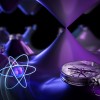
Realization of an anomalous Floquet topological system with ultracold atoms
K. Wintersperger, C. Braun, F. N. Unal, A. Eckardt, M. Di Liberto, N. Goldman, I. Bloch, M. Aidelsburger
Nature Physics 16 (10), 1058-+ (2020).
Standard topological invariants commonly used in static systems are not enough to fully capture the topological properties of Floquet systems. In a periodically driven quantum gas, chiral edge modes emerge despite all Chern numbers being equal to zero. Coherent control via periodic modulation, also known as Floquet engineering, has emerged as a powerful experimental method for the realization of novel quantum systems with exotic properties. In particular, it has been employed to study topological phenomena in a variety of different platforms. In driven systems, the topological properties of the quasienergy bands can often be determined by standard topological invariants, such as Chern numbers, which are commonly used in static systems. However, due to the periodic nature of the quasienergy spectrum, this topological description is incomplete and new invariants are required to fully capture the topological properties of these driven settings. Most prominently, there are two-dimensional anomalous Floquet systems that exhibit robust chiral edge modes, despite all Chern numbers being equal to zero. Here we realize such a system with bosonic atoms in a periodically driven honeycomb lattice and infer the complete set of topological invariants from energy gap measurements and local Hall deflections.
